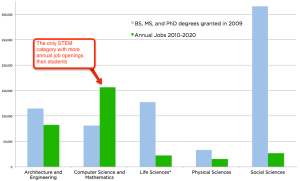The folks from Code.org posted something this morning that merits more than a standard Facebook response. They posted the following graphic:
Then raised the question, is the government focusing too much energy on traditional STEM education, and not enough on computer science, since the job gap is in computer science, not in traditional STEM (in fact, there is a reverse job gap in STEM – more students than jobs). My reply to them is sort of a yes, but…
Yes, we need to be focusing on computer science education if there is this job gap, but…
The real problem is that we shouldn’t be having this conversation.
Back in the mid-80’s (I think that is the late Cretacious period of computer science), I was an undergraduate TA in the UCLA Department of Chemistry and Biochemistry undergraduate computer lab. I was majoring in Biochemistry, but had fallen in love with computers in high school, like so many others in my age group. The professor in charge of the lab, Dr. Sandra Lamb, was continuously frustrated by the hesitance of so many professors to include computer science education in their curriculum. This was a huge problem among the biochemistry professors, and less so among the chemistry professors. Only one professor, Dr. Daniel Atkinson, who had published a book on using spreadsheets to model cellular metabolism, agreed with her concept.
Fast forward maybe 10 years later, when I was setting up quality departments in the biotechnology sector. At that point, I was developing a significant amount of my own software, for document management, batch record management, etc., simply because it was impossible to manage the amount of work we had in a startup pharma company without the benefit of automation. It amazed me, at that point, as computer driven instrumentation had become the rule for the analytical lab, and was becoming the rule for the manufacturing environment (in my case it was the rule – all of our manufacturing processes were computer driven), how few people were coming out of the university system with any significant understanding of how computers operate.
I had, by then, reached the conclusion that perhaps pure computer science wasn’t so important on its own, than having a robust computer science component within a science education. In fact, I think virtually all disciplines need this. Within the sciences, the ability to use a computer is absolutely required (and as someone who has managed support functions for a number of years, it is a sore point how many scientists can barely turn one on these days). However, the ability to make a computer work for you is frequently as important. So many science careers require programming at some level. Bio-statisticians need to program in SAS, S+, and R. Process scientists need to build complex models, coding in tools like Matlab. People in other disciplines need to know how to code and script their various management and analysis tools to get the most use out of them.
In some cases, the lack of computer science knowledge simply means that a specific job may be out of reach (I can’t think of too many people in the bio stats field who can’t handle a reasonable amount of stats related programming), but in others it means that you have individuals who quite literally wallow in inefficiency. They don’t know how to code, so they do things the old fashioned way, waiting for someone who does know how to code to come along and rescue them.
The time for that has come to an end. I somehow suspect that a large number of the computer science jobs represented in the above graphic are jobs where the ideal candidate would have significant knowledge in a specific arena, like STEM, but must also have the computer science background. I suspect the same is true in the jobs listed within the STEM categories. We should no longer have the conversation of computer science vs. STEM, because we should no longer be graduating STEM students without significant computer science education.
It boggles the mind that Code.org needs to exist. This is the 21st century, after all, and this conversation should have ended back in the 20th when I was in school. I love Code.org. I support what they are doing. I also look forward to the day, as I’m sure they do, that they no longer need to exist.
